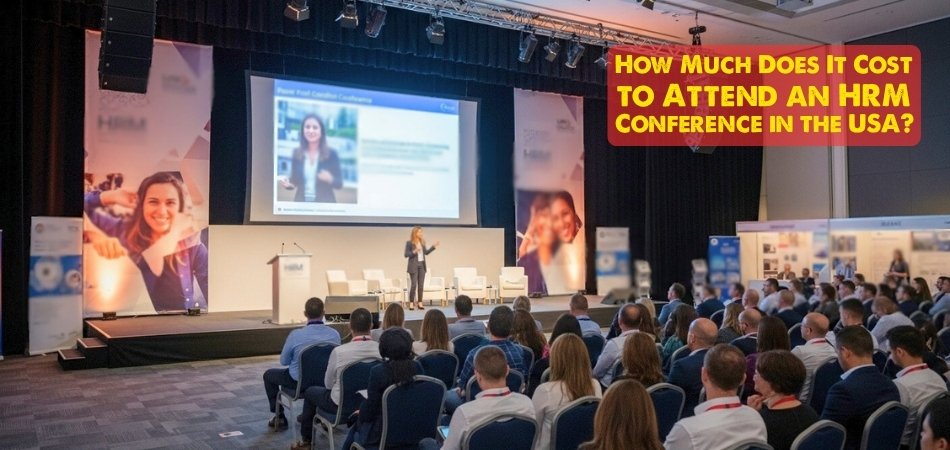An HRM (Human Resource Management) conference in the USA can be a great way to learn new things, meet other HR professionals, and grow your career. These events often include talks, workshops, and fun networking sessions. But before you sign up, it’s smart to know what it might cost.
So, how much does it cost to attend an HRM conference in the USA?
The cost is usually between $400 and $3,000 per person. This depends on the ticket price, travel, hotel, and any extra sessions or events you choose. Some options can make the price go even higher.
Want to see what’s included and how to plan your budget? Keep reading to learn more!
How Much Does It Cost to Attend an HRM Conference in the USA?
Attending an HRM conference in the USA usually costs between $400 and $3,000 per person. The price depends on the registration fee, travel, hotel stay, and extra activities like workshops. Some conferences may cost more if you choose special options or extra events. The following factors can affect the total cost of your HRM conference participation in the USA:
Registration Fees
- Most of the cost comes from the ticket you choose, and different options have different price levels. Premium and executive passes cost more, especially if they include private sessions or special access.
- Early bird pricing can save money, but it ends quickly, so planning early is very important for attendees. Membership status in HR groups also lowers the cost and offers access to special events.
- Standard tickets range between $400 and $1,500, but premium ones can go up to $2,500 or even more.
Location and Venue
- Large cities like New York or San Francisco tend to cost more due to expensive hotels and travel. Popular places also bring higher food prices, especially when dining near the event area.
- Smaller cities offer better prices on rooms and meals, helping to reduce total spending over several days. Virtual conferences in USA can also help save money when travel isn’t possible or needed.
Travel and Accommodation
- Flight costs change based on when and where you book; booking early can often reduce the final cost. Lodging near the venue makes commuting easy, but is often more expensive than staying farther away.
- Meals, transport, and small extras like Wi-Fi or laundry add up fast, especially over a few days. Having a set travel budget helps avoid surprises and overspending during the trip.
Program Length and Schedule
- A two-day event will cost less than a week-long one because fewer nights and meals are needed. Long programs also mean taking more time off work, which can increase both personal and professional costs.
- Bigger events often include more speakers and sessions, making them more expensive due to the wider range of topics. Workshops and evening sessions add value but also raise the total price quickly.
Optional Extras and Events
- Many conferences offer add-ons like skill workshops, leadership training, or evening networking parties. These extras often come with added fees and can raise your total spending by a few hundred dollars.
- Some people skip extra events to save money, but others find the added learning worth the cost. VIP sessions can offer private time with speakers, making them attractive to executives and leaders.
Discounts, Scholarships, and Group Rates
- Group discounts can lower the cost per person if you’re attending with coworkers or classmates. Always check if the event offers student pricing or special rates for nonprofit workers.
- Scholarships are sometimes available for early-career HR professionals, but space is limited, so apply early. Sponsorship from a company or organization can also help cover fees, travel, and hotel stays.
How to Organize Your Budget for Attending an HRM Conference in the USA?
Getting ready for an HRM conference takes more than just packing your bag. Planning your budget helps avoid last-minute stress. Use these steps to make sure your money goes where it matters most.
Understand Every Possible Cost
Before setting numbers, list all expected costs, including registration, travel, hotel, food, and local transport. Make sure to check for workshop fees, networking dinners, or VIP sessions. Add small extras like clothes, visa charges, or conference supplies. A full list gives you a clear view of your total expected spending.
Pick the Right Budgeting Method
Don’t repeat old mistakes—review past spending if you’ve attended before. Use incremental budgeting when costs are similar to last year’s event. For a first-time trip, go with zero-based budgeting and explain every expense clearly. This helps ensure your money supports your learning, not just the trip.
Review Past Costs and Predict New Ones
Look at receipts or reports from previous events, if available, to catch spending patterns. Use updated pricing from airline sites or hotel apps to forecast new costs. Always adjust for inflation or market shifts, especially if prices seem higher than usual. Estimating early helps avoid overspending later.
Match Budget with Learning Goals
Spend more on what truly helps you grow in your HR role. If certification is your goal, budget for special workshops. When attending an HRM conference in the USA, choose sessions that give direct career benefits. Avoid paying extra for activities that don’t match your professional interests.
Add a Backup Fund for Surprises
Not every cost will show up during planning—unexpected things always come up. Add 10–15% of your total budget as a safety net. This covers changes in flights, hotel upgrades, or unplanned events. It’s better to have it and not need it than the other way around.
Look for Help with Costs
Check if your company offers a development fund or travel allowance for conferences. Ask HR about internal programs that cover registration or travel. Scholarships are sometimes available through industry groups or event organizers. Getting support means you can focus more on learning, not stressing over money.
Track Spending and Update Plans
Use a simple app or spreadsheet to log each cost as you plan and book. When plans shift, update your numbers to stay on track. Watching your spending keeps surprises away and your goals clear. A flexible budget gives you control without cutting into your learning.
Mistakes You Must Avoid While Creating a Budget for Your Conference Participation
Planning a budget for a conference takes focus, research, and smart choices. Many people forget key details and end up overspending. A strong plan helps you enjoy the event without money stress. Avoid these common mistakes to keep your budget clear and useful.
- Skipping Cost Research: Guessing prices without checking real numbers often leads to overspending. Look at current rates for hotels, transport, and tickets first.
- Ignoring Extra Fees: Small things like baggage, internet, or late check-out charges can add up fast. Always include these in your plan early.
- No Emergency Fund: Without backup money, any sudden change can wreck your whole plan. Set aside 10–15% for surprise expenses always.
- Overlooking Meal Costs: Some meals might not be part of the event ticket. Budget for breakfast, lunch, dinner, and even coffee breaks too.
- Not Comparing Options: Choosing the first flight or hotel you see may cost more. Compare prices to find the best deals around.
- Forgetting Travel Needs: Visas, insurance, or transit passes are easy to forget. List everything you need before leaving to avoid extra costs.
- Chasing Every Add-on: Extra sessions and VIP passes sound fun, but may not offer real value. Choose only what supports your goals.
- Missing Tracking Tools: Without tracking tools, you may lose sight of what’s been spent. Use a notebook or app to stay updated.
Are There Any Ways to Identify Whether Your Conference Participation is a Success?
Yes, you can definitely tell if your conference participation was a success. There are clear signs that show whether your time, effort, and money were well spent. These signs help you understand what you gained and how it supports your goals moving forward.
Engagement During Sessions
Watch how often you join in discussions, Q&A sessions, or live polls. Staying through each session also shows solid interest. Pay attention to how much time you spent on networking or workshop activities. Use social media feedback and tags to see if the event created real buzz.
Growth in Skills and Knowledge
Think about what you learned and how useful it is in your daily HR work. Rate the sessions based on their content value and speaker impact. If you took notes or gathered tools, those are signs of strong learning. New ideas should feel clear and ready for real use.
Effective Networking Results
Count how many people you met and shared useful conversations with. Use apps, business cards, or social links to track them. Make notes on connections that could help your company or career soon. While finding HRM conferences in the USA, such networks make each trip more rewarding.
Positive Feedback and Satisfaction
Read or complete the post-event survey to review your overall experience clearly. Check ratings on the speakers, sessions, venue, and services provided. If your scores are high, you likely had a successful event. Use feedback to guide future event choices and budgeting plans.
Real Impact After the Event
Look at whether your ideas or skills helped your team solve problems or improve HR practices. Track if changes led to better retention, hiring, or employee engagement. Think about any new process or project started because of what you learned. That impact shows strong personal or team ROI.
Overall Participation Levels
Match how many sessions you planned to attend with the number you actually joined. Missing many parts often means a poor return. Measure how involved you were in side events like workshops or bonus sessions. Active participation often means you made the most of your time there.
FAQs About the Cost to Attend an HRM Conference in the USA
Attending an HRM conference in the USA can be an exciting and valuable experience. However, costs can vary based on several factors. Below are 10 relevant FAQs to help you better understand the financial aspects of attending such events.
What Is the Average Cost of a One-Day HRM Conference?
A one-day HRM conference usually costs between $200 and $800. This includes the base registration fee, basic meals, and light materials, but may not cover travel or lodging.
Do Virtual HRM Conferences Cost Less Than In-Person Ones?
Yes, virtual HRM conferences are usually cheaper, often ranging from $50 to $500. They remove the need for travel, lodging, and meals, making them more affordable for professionals with tight budgets or limited support.
How Much Should I Budget for Meals During a Conference?
Meals not included in the event may cost around $30 to $75 per day. This estimate covers breakfast, lunch, and dinner outside of scheduled conference meals and depends on the city or location of the event.
Are There Special Rates for Students or Nonprofit Workers?
Many conferences offer student and nonprofit discounts, with fees lowered by 20% to 50%. These rates aim to support learning and growth opportunities for individuals or groups with limited financial resources or organizational backing.
Is Lodging Included in the Conference Fee?
No, lodging is usually not part of the registration cost. Attendees typically book nearby hotels separately, with nightly rates ranging from $100 to $300, depending on the city and proximity to the conference venue.
What’s the Cost of the Optional Certification Workshops?
Optional workshops, especially those offering certifications, may cost an extra $150 to $500. These sessions provide advanced training and resources, often held before or after the main conference schedule to boost learning outcomes.
Can Group Bookings Reduce the Overall Cost?
Yes, group registrations often come with discounted pricing, sometimes saving up to 15% per person. Organizations sending multiple team members can benefit from these deals while also fostering shared learning and internal collaboration post-event.
Are Early Bird Rates Worth It?
Early bird registration can save attendees between 10% and 30% off regular pricing. These rates reward early planning and often include bonus perks such as access to preferred sessions or discounted workshop pricing.
How Much Does Local Transportation Add to the Budget?
Local travel expenses like rideshares, taxis, or transit can cost $10 to $50 per day. Costs vary based on city size and location of lodging relative to the venue, especially in high-traffic metro areas.
Do International Attendees Face Higher Costs?
Yes, international participants often face higher expenses due to airfare, visa fees, insurance, and currency conversion. Overall costs may range from $2,000 to $4,500, depending on distance and length of stay in the USA.
Last Words
Your HR career can be enhanced by attending HRM conferences. But it’s important to plan your money and time well. You may ask, how much does it cost to attend an HRM conference in the USA? The answer depends on things like ticket type, travel, hotel, and extra events.
Some conferences can be cheap, while others may cost a lot. By knowing what to expect, you can plan better and avoid stress. Make choices that match your goals. With the right plan, your time at the conference will be useful and worth the cost.








